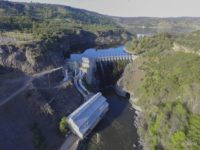
In the past, labor camps of Brazilian mega-projects at remote sites were rough-and-tumble affairs, marked by drunkenness, frequent fistfights and prostitution. "That doesn't fly these days," says Henrique Harold Dijkstra, project manager for Trachtebel Engineering GDF Suez, the owner's on-site representative at the Jirau dam.
Today's work camps, while not luxurious, are as comfortable as military bases, with barracks-style accommodations, laundries, chapels, rec rooms, theaters, internet cafes, branch banks and mess halls. The perimeter is fenced, and traffic in and out is tightly controlled. Bars and bordellos haven't disappeared, but they are off-site operations.
 |
Federal troops were called in to restore order, but the disturbance set back the schedule by months.
Unlike San Antonio, which draws the majority of its labor from nearby Porto Velho, Jirau is a remote upriver outpost; 70% of the workforce hails from elsewhere. Having lost 10,000 beds and 17 buses, Dijkstra says, the project fired 24 strikers charged with vandalism and sent home hundreds until temporary housing and replacement buses could be secured.
The speed and extent of damage "caught everyone by surprise," says Dijkstra, adding that "it was essentially a turf battle between two unions."
By June, the jobsite had returned to normal. Workers won a 7% raise at Jirau and San Antonio and modifications to work rules concerning overtime.
The first power from Jirau is scheduled to flow to the national power grid by January 2013.



Post a comment to this article
Report Abusive Comment